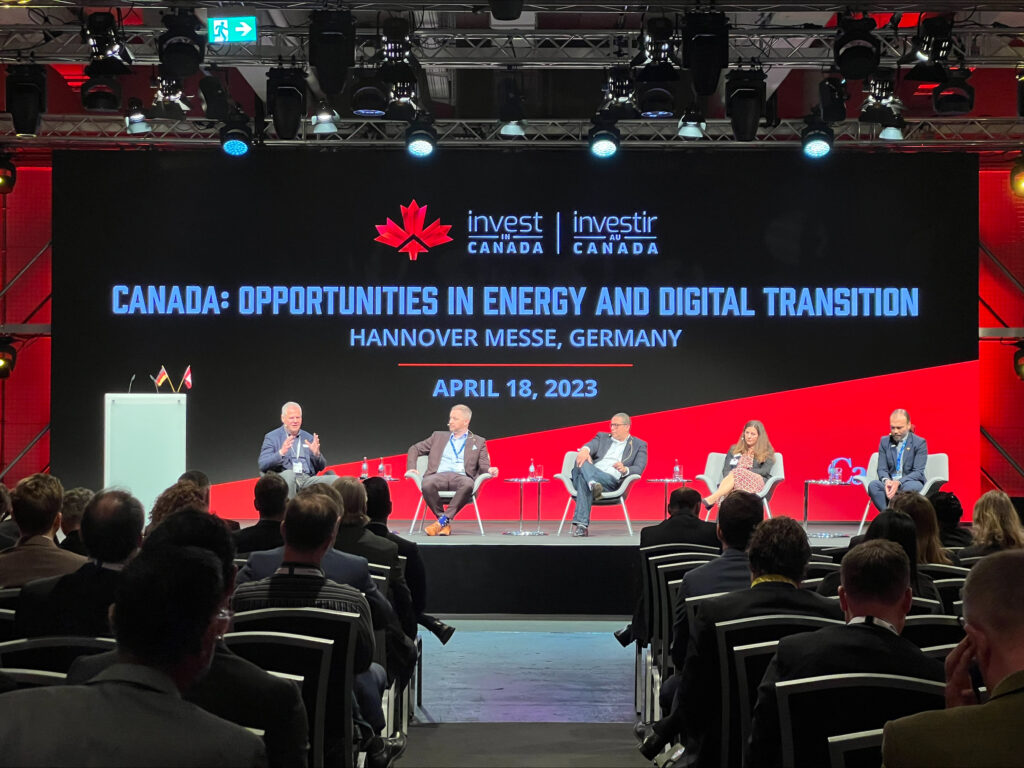
The big picture: Canada at Hannover Messe – Growing the country’s advanced manufacturing capabilities
October 2, 2023
By Stephanie Holko, NGen
 Canada is a serious player in advanced manufacturing, as showcased at Hannover Messe 2023. (Photo: Nelson Netzereab, digital marketing manager at NGen)
Canada is a serious player in advanced manufacturing, as showcased at Hannover Messe 2023. (Photo: Nelson Netzereab, digital marketing manager at NGen) At the 2023 Hannover Messe, the world’s largest exhibition of industrial automation solutions, Canadian companies showcased their advanced manufacturing capabilities. The annual conference was hosted in Hannover, Germany in April 2023. Hannover Messe is the event where companies bring the latest research and emerging technologies, and speculative demos for future processes to spark ideas and strategies for the long term. If you want to look at what’s happening globally, or if you want to find global partners, Hannover Messe is a great place to do it.
Canada is the official partner country for Hannover Messe 2025 and there is a lot of activity leading up to the event. Next Generation Manufacturing Canada (NGen) is Canada’s Advanced Manufacturing Global Innovation Cluster. NGen organized Canada’s 2023 pavilion and will lead Canada’s participation in 2025, to grow Canada’s advanced manufacturing capacity.
Canada is a serious player in advanced manufacturing and NGen’s role at Hannover Messe is threefold: to benchmark and learn about cutting-edge technologies and applications worldwide, to increase the visibility of Canadian advanced manufacturing companies and to prepare to showcase Canada’s strengths in 2025.
Technology is continually advancing. In the past, Hannover Messe showed a lot of machinery at work and advanced robotics is still on display. However, the emphasis has now shifted to software solutions. Advanced robotics trends showcased this year focused on pushing the limits of robotics in parallel with manufacturing trends of flexible and small-batch manufacturing and human collaboration. Robotics solutions included intricate precision and tooling, varying sensitivities and pressures, multi-program platforms aided by machine vision, rapid program upload and deployment, collaboration with humans, as well as a focus on energy-efficient design and operation. Instead of building a production process around a robot’s capacity, production lines are being re-imagined to be flexible and meet ever-evolving business needs.
Beyond robotics, software solutions and artificial intelligence is embedded in just about everything. We saw platform companies demonstrating use cases in priority sectors. While the individual use cases are still moving parts of the manufacturing cycle forward, artificial intelligence solutions for manufacturers have advanced from single-point AI applications to AI-enabled interoperable platforms across supply chains. Data and standards are required along with collaboration between supply chain partners. This is the next wave of change to level-up manufacturing value chain efficiency.
This past year, we saw more applied use cases for leading technologies, such as digital twins. Digital twins were displayed as key for flexible manufacturing – for design and collaboration, virtual commissioning and training providing rapid start-up and shorter switch-over times, real-time monitoring and troubleshooting and virtual scenario analysis. Digital twins are connecting with other technologies to build exciting use cases, such as VR and AR for virtual troubleshooting and operation. While the technology is not brand-new, the uptake and adoption are beginning to feel inevitable. One exhibitor even used their digital twin platform to virtually commission their demo for exhibition due to supply chain shortages preventing assembly and hot commissioning until the last minute.
While the application of these technologies is changing the landscape, industrial decarbonization and battery technologies have taken centre stage at Hannover Messe. Decarbonization strategies need alternative energy generation and storage; hydrogen and battery technologies were well represented in 2023. There was an entire exhibit hall focused on hydrogen and clean fuel technologies. The latest in industrial electrification and battery tech were on display. Regenerative designs are starting to emerge, such as self-powering devices using thermal gradients or kinetic energy, minimizing or eliminating the need for energy storage in some cases. Real-time carbon tracking and reporting are becoming more popular and contributing to transparency in manufacturing supply chains. Industrial decarbonization and energy solutions will continue to be relevant for the foreseeable future.
NGen is founded on the principle that digital transformation in advanced manufacturing will enrich the lives of Canadians, delivering better products and good jobs while generating the economic growth essential to a better future. The technologies and trends seen at Hannover Messe mirror the priorities and capabilities of Canadian industry and NGen’s upcoming project funding programs. Canadian manufacturers and technology companies are well-positioned to lead in these global trends. Several cutting-edge Canadian companies were stationed in the Canadian Pavilion at Hannover Messe this year, showcasing products, technologies and services to grow manufacturing capabilities. Keep an eye out for Canada’s Hannover Messe partnership in 2025. To learn more, please connect via info@ngen.ca.
Stephanie Holko is the director of project development at Next Generation Manufacturing Canada (NGen). She loves connecting emerging technologies with existing manufacturing problems and believes the future of manufacturing is in the adoption of new ways of working. Stephanie is a licensed Professional Engineer in Ontario.
Advertisement
- Bosch Rexroth names Erwin Wieckowski as president and CEO for North and Central America
- Report: Canadian manufacturing industry contracts for fifth consecutive month in September 2023